Samsung Galaxy Nexus & Ice Cream Sandwich Review
by Brian Klug & Anand Lal Shimpi on January 18, 2012 1:34 PM ESTThe Browser
The improvements to the Android web browser are some of the most noticeable in Ice Cream Sandwich. Browser performance both in JavaScript rendering and web page scrolling is worlds better than in Gingerbread. We've already explained why scrolling is smoother (full OpenGL ES render path), while the js performance improvements come courtesy of a newer V8 rendering engine in ICS.
The browser in 4.x also includes essentially everything that made the browser in 3.x smooth as well. As opposed to the Android 2.x browser's immediate rendering system - which would redraw the page in its entirety as you zoomed and panned around and seem choppy as a result - Android 3.x/4.x now render tiles into a backing store for webpages. This is the same system that iOS, webOS, and Samsung's custom browsers use, and as a result panning and translating around is now just as smooth as it is in those platforms. To be totally honest, this is probably one of the single largest and most welcome improvements over Android 2.x because of how dramatic the difference is.
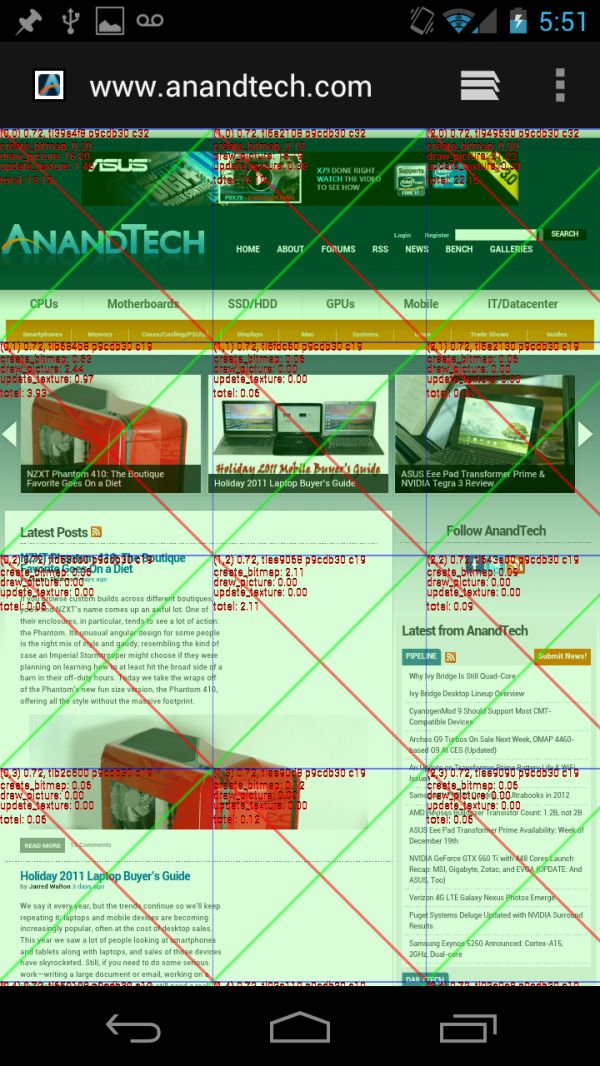
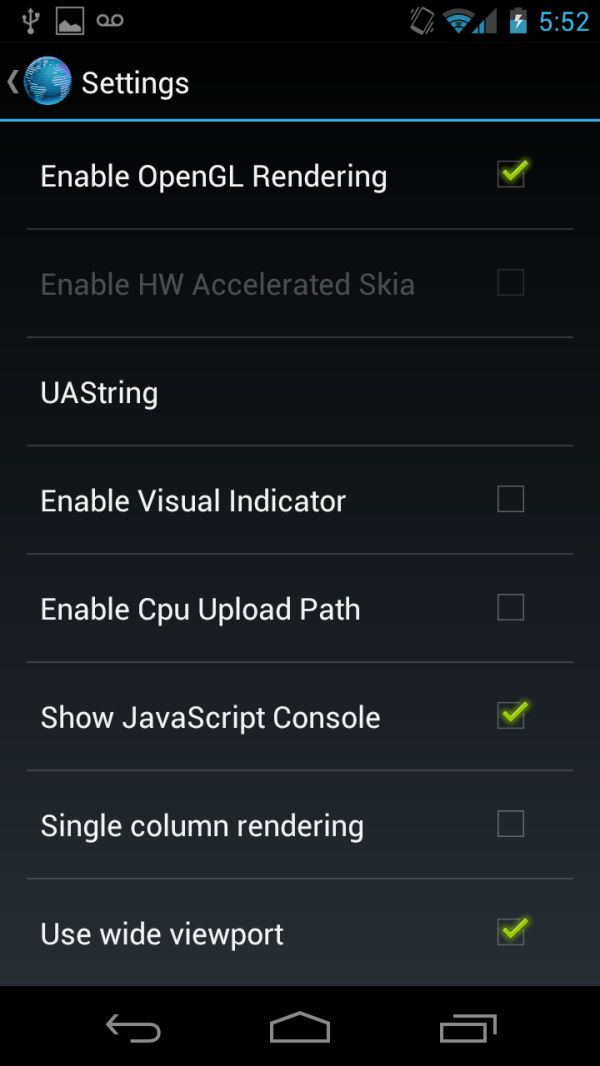
Android 4.0 browser with visual indicator enabled (left), debug settings (right)
In Android 4.0 you can actually go inside the debug settings for the browser (enter about:debug into the address bar, enter, then a new settings pane emerges) and enable or disable OpenGL assisted rendering for the browser. With it off, it feels just like 2.x's choppy stock browser, and with it on, it feels buttery smooth like 3.x. The difference is beyond dramatic. This is actually a feature that was present in Android 3.x as well.
A look at SunSpider and Browsermark performance tells us all we need to know about how the JavaScript V8 engine performance has changed under ICS:
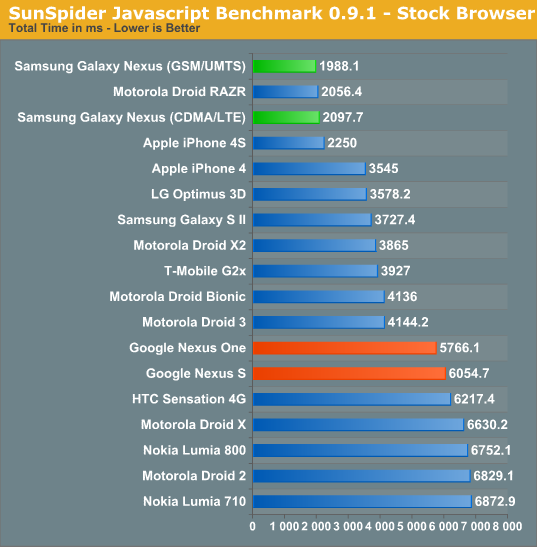
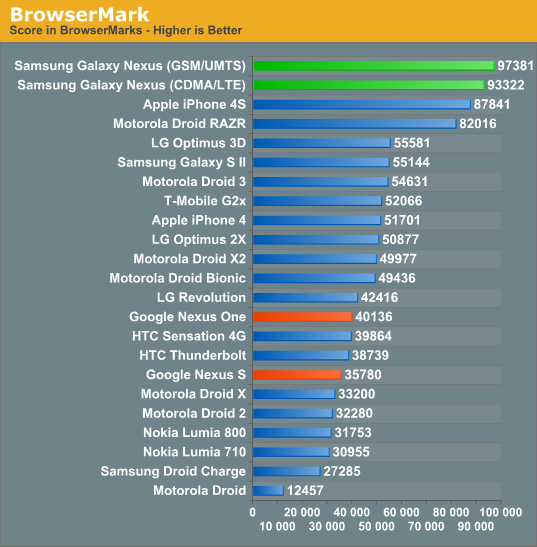
While companies like Motorola and Samsung backported parts of the Honeycomb browser to their own Gingerbread browsers, the stock Gingerbread browser needed work. ICS modernizes the Android web browser and finally removes the need for third party customizations, at least from a performance standpoint.
| Gingerbread vs. Ice Cream Sandwich | ||||
| Gingerbread | Ice Cream Sandwich | |||
| Browser |
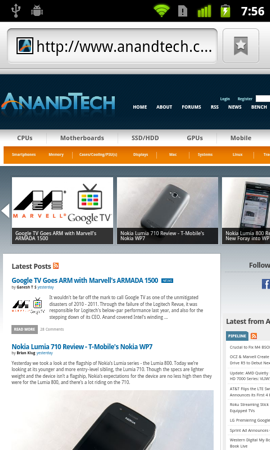 |
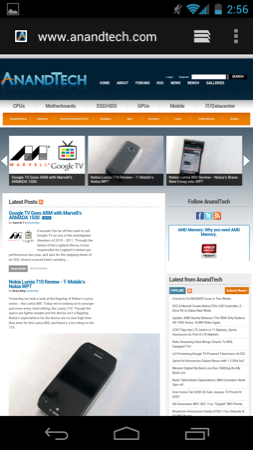 |
||
The ICS browser is still WebKit based and uses a much newer version of WebKit than what you'll find in Android 2.3.6. Compared to the latest Honeycomb browser however there's not all that much difference in version number. The ICS browser does still use an older version of WebKit than Mobile Safari in iOS 5.0.1:
| User Agent String Comparison | |||||
| Device | OS | WebKit Version | UA String | ||
| Apple iPhone 4S | iOS 5.0.1 | 534.46 | Mozilla/5.0 (iPhone; CPU iPhone OS 5_0_1 like Mac OS X) AppleWebKit/534.46 (KHTML, like Gecko) Version/5.1 Mobile/9A405 Safari/7534.48.3 | ||
| Samsung Galaxy Nexus | Android 4.0.2 | 534.30 |
Mozilla/5.0 (Linux; U; Android 4.0.2; en-us; Galaxy Nexus Build/ICL53F) AppleWebKit/534.30 (KHTML, like Gecko) Version/4.0 Mobile Safari/534.30 |
||
| ASUS TF Prime | Android 3.2.1 | 534.13 |
Mozilla/5.0 (Linux; U; Android 3.2.1; en-us; Transformer Prime TF201 Build HTK75) AppleWebKit/534.13 (KHTML, like Gecko) Version/4.0 Safari/534.13 |
||
| Google Nexus One | Android 2.3.6 | 533.1 | Mozilla/5.0 (Linux; U; Android 2.3.6; en-us; Nexus One Build/GRK39F) AppleWebKit/533.1 (KHTML, like Gecko) Version/4.0 Mobile Safari/533.1 | ||
HTML5 compatibility is fairly similar to Honeycomb, although a significant improvement compared to Gingerbread. If you haven't had any experience with Honeycomb tablets, the ICS browser will feel like like brand new technology.
| The HTML5 Test | ||||||||
| Test | Apple iPhone 4S | Samsung Galaxy Nexus | Google Nexus One | ASUS Eee Pad Transformer | ASUS Eee Pad Transformer Prime | |||
| OS | iOS 5.0.1 | Android 4.0.2 | Android 2.3.6 | Android 3.2.1 | Android 3.2.1 | |||
| WebKit Version | 534.46 | 534.30 | 533.1 | 534.13 | 534.13 | |||
| Total Score | 305 (and 9 bonus points) | 256 (and 3 bonus points) | 182 (and 1 bonus point) | 222 (and 3 bonus points) | 233 (and 3 bonus points) | |||
| Parsing rules | 11 (2 bonus points) | 11 (2 bonus points) | 1/11 | 11 (2 bonus points) | 11 (2 bonus points) | |||
| Canvas | 20 | 20 | 20 | 20 | 20 | |||
| Video | 21/31 (4 bonus points) | 21/31 | 21/31 | 21/31 | 21/31 | |||
| Audio | 20 (3 bonus points) | 20 (1 bonus point) | 20 (1 bonus point) | 20 (1 bonus point) | 20 (1 bonus point) | |||
| Elements | 22/29 | 23/29 | 13/29 | 20/29 | 20/29 | |||
| Forms | 77/100 | 57/100 | 33/100 | 54/100 | 54/100 | |||
| User Interaction | 17/36 | 17/36 | 0/36 |
0/36 |
0/36 | |||
| History and navigation | 5 | 5 | 5 | 0/5 | 0/5 | |||
| Microdata | 0/15 | 0/15 | 0/15 | 0/15 | 0/15 | |||
| Web applications | 15/20 | 15/20 | 19/20 | 15/20 | 15/20 | |||
| Security | 5/10 | 5/10 | 5/10 | 5/10 | 5/10 | |||
| Geolocation | 15 | 15 | 15 | 15 | 15 | |||
| WebGL | 9/25 | 9/25 | 0/25 | 0/25 | 9/25 | |||
| Communication | 32/36 | 12/36 | 9/36 | 10/36 | 12/36 | |||
| Files | 0/20 | 10/20 | 0/20 | 10/20 | 10/20 | |||
| Storage | 15/20 | 15/20 | 15/20 | 15/20 | 15/20 | |||
| Workers | 15 | 0/15 | 0/15 | 0/15 | 0/15 | |||
| Local multimedia | 0/20 | 0/20 | 0/20 | 0/20 | 0/20 | |||
| Notifications | 0/10 | 0/10 | 0/10 | 0/10 | 0/10 | |||
| Other | 6/8 | 6/8 | 6/8 | 6/8 | 6/8 | |||
Performance and compatibility are obvious improvements, however there's much more to the ICS browser. For starters it implements tabbed browsing, a feature that has been available on Honeycomb but not in Gingerbread. Given the small screen size, tabs aren't immediately visible but are instead switched between after hitting the tabs button. The process makes sense and thanks to GPU accelerated drawing, scrolling through tabs is extremely smooth.
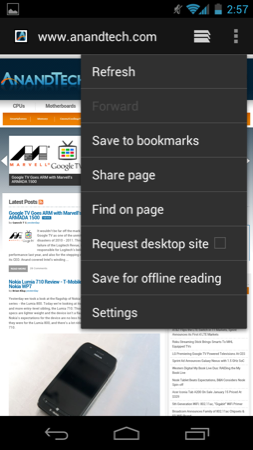
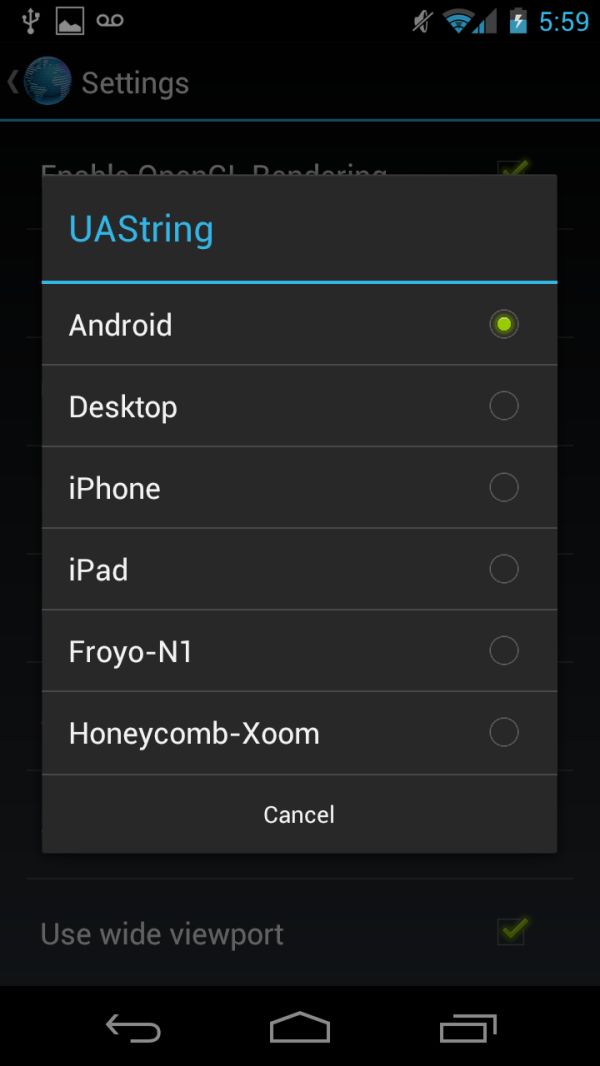
The normal desktop UA switcher (left), More options under developer settings (right)
Google added quick user agent switching to ask for desktop versions of websites vs. mobile by default through a checkbox under settings. Enabling the option changes the browser's UA string from representing itself as a mobile Safari browser to Chrome 11. There's also a menu inside debug settings to change your user agent (UAString) to look like the desktop, iPhone, iPad, Nexus One with Froyo, or a Xoom with Honeycomb.
| User Agent String Comparison | |||||
| Device | UA String | ||||
| Default |
Mozilla/5.0 (Linux; U; Android 4.0.2; en-us; Galaxy Nexus Build/ICL53F) AppleWebKit/534.30 (KHTML, like Gecko) Version/4.0 Mobile Safari/534.30 |
||||
| Desktop |
Mozilla/5.0 (X11; Linux x86_64) AppleWebKit 534.24 (KHTML, like Gecko) Chrome/11.0.696.34 Safari/534.24 |
||||
Prior to ICS, the browser was a serious limitation of the Android platform on smartphones - it was choppy, and something OEMs continually replaced with their own (sometimes worse, sometimes better) browser. Granted you could always download and replace the browser with one of your own choosing, but for the mainstream user the Gingerbread browser was a problem. In ICS the browser is a blessing to use. It's very fast, smooth and compatible. We've had no problems using the Honeycomb browser and the same can be thankfully said about the evolution of it in ICS.










185 Comments
View All Comments
roedtogsvart - Wednesday, January 18, 2012 - link
Finally!prophet001 - Wednesday, January 18, 2012 - link
Just had one of this hit my desk today :D very nice phone.Owls - Thursday, January 19, 2012 - link
No offense but I'm kind of pissed after reading this article with what amounts to a masturbatory article about the iphone 4s.For example on an ipad 2 and iphone 4s there is plenty of lag here and there using the UI on par with gingerbread. On ICS? It's pratically nonexistent.
The camera? The only issue I found was that on Auto the shots didn't always come out great. Some manual adjustments fixed that and after comparing the shots to my dad's iphone 4s there's virtually no difference.
I pretty much stopped reading after the camera section.
michael2k - Thursday, January 19, 2012 - link
What kind of lag are you talking about? The A5 SoC is one of the most powerful out there and it's already been noted in several reviews how the older A4 SoC plus iOS 4 and 5 outperformed Gingerbread. You're saying the lag on ICS is somehow better than an A5 plus iOS 5 by saying the A5 + iOS 5 is as laggy as a CPU bound unaccelerated Android 2.3?medi01 - Friday, January 20, 2012 - link
Why, do you think, anand is using 720p "off-screen" in benchmarks, why not try it directly on screen?PS
Oh, and why "black levels" aren't present on screen comparison? And why iphones dissapear from charts where they are wtfpwned by other phones?
Sigh. Disgusting.
michael2k - Monday, January 23, 2012 - link
All the phones and tablets would go up in number if they used native resolution, but then you can't actually compare the HW because each would be constrained by different resolutions. By using 720p offscreen you get to judge all the HW on the same scale.Also, Anand has definitely reported black levels:
http://www.anandtech.com/Show/Index/4215?cPage=4&a...
I don't know of any places where the iPhone disappear so much as the iPhone doesn't run the app. You'll notice that the rankings appear congruent; 4S followed by S2 with the Nexus and 4 on the bottom. Nothing changes, except that certain apps aren't available for the iPhone. Rightware Basemark is an Android app, silly.
medi01 - Wednesday, January 25, 2012 - link
And "actual HW number" tells you what? That GPU X is faster than GPU Y? Instead of saying "phone X would render faster than phone Y"? How is first more appropriate mesurement than the latter?@Also, Anand has definitely reported black levels:@
Are you kidding me? Where is vs amoled comparison in your link? How is it related to the article in discussion?
Not only do they skip "black levels", they somehow manage to make a picture of AMOLED screen where BLACK looks GREY. Wow, great job misleading readers.
michael2k - Wednesday, January 25, 2012 - link
Yes, GPU X is faster than GPU Y is a perfectly valid comparison. You would have to ask Anand why he thought comparing GPUs was a valid benchmark, but given the long track record of how responsive the iPhone has been compared to Android, I don't see how that anything else is relevant. The fact that offscreen performance favors the iPhone 4S doesn't change that it doesn't favor the iPhone 4!Also, why would he compare to amoled when in fact there are no amoled tablets to compare to?
You're a baseless and pointless critic.
doobydoo - Thursday, January 19, 2012 - link
There is no lag at all on the iPad 2 or the iPhone 4S, what are you talking about?I think you're more pissed off that the Nexus came with an average camera and a 2-year-old GPU.
Lucian Armasu - Monday, January 30, 2012 - link
Well, iPhone 4 came with a 2 year old GPU, too in 2010, and much lower FPS than the competition, if you remember those GPU charts, where the iPhone 4 was the last at the bottom. Not too many people seemed to care about it.